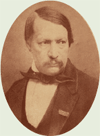An Extract from Veva, or the War of the Peasants
By Hendrik Conscience

The general made a sign to the company of Waldeghem, which immediately advanced and ascended the rampart, the whole army moving slowly after it. The troops, however, who were crowded against the inner fortifications, were in such haste to escape that they began to scale the outer ramparts in five or six different places, and grouped themselves in a mass on the approaches to the bridge.
Whether it was that the plan of the flight from the city had been betrayed, or that the French sentinels on the heights which commanded the Herenthals Gate could hear a certain noise caused by the confusion on the bridge, the report of a cannon was heard, pealing terrifically over the city and the surrounding country.
That ominous signal awakened the most terrible alarm in the hearts of the patriots. The companies who were in the rear of the column pushed on violently towards the bridge those who were before.
Immediately there arose a thrilling shriek of distress from the depths of that terrified crowd, and not a heart was there that did not throb with the most dreadful apprehensions.
No longer having any care for the general safety, each person rushed forward. A confused multitude scrambled over the rampart and poured like a torrent upon the bridge, the only means of egress from the devoted city. A hideous crash then mingled with the roar of the cannon and the rattle of the musketry. The bridge had yielded with the weight of the densely-packed mass of fugitives, and had fallen into the water, carrying with it its unhappy burthen.
This terrible accident, however, did not arrest the course of those who were behind. In the deep darkness of the night, and urged on by a mortal fear, they continued to throng forward, precipitating themselves from the ramparts and falling headlong into the moat. The cries and shrieks of their mangled and drowning brethren, far from stopping, only increased the frenzied impatience of the others to quit the city. The moat was soon completely filled with the corpses of the unfortunate villagers: it became a scene too horrible for language to describe.
Meanwhile the French companies who had advanced nearest to the bridge drew up quickly in order of battle before the great floodgate, and commenced firing in the direction from which the cries and shrieks proceeded.
While the patriots were stifled or crushed by hundreds in the moat, the enemy's shot, like a murderous hail, poured upon those who were fortunate enough to reach the other side of the water.
At the end of about half an hour the fearful tumult had ceased; all had relapsed into dreary silence. But the shadows of night were spread over five hundred dead!
From Veva, or the War of the Peasants (De Boerenkryg, 1853). Anonymous translation. London: Burns and Oates, s.d.